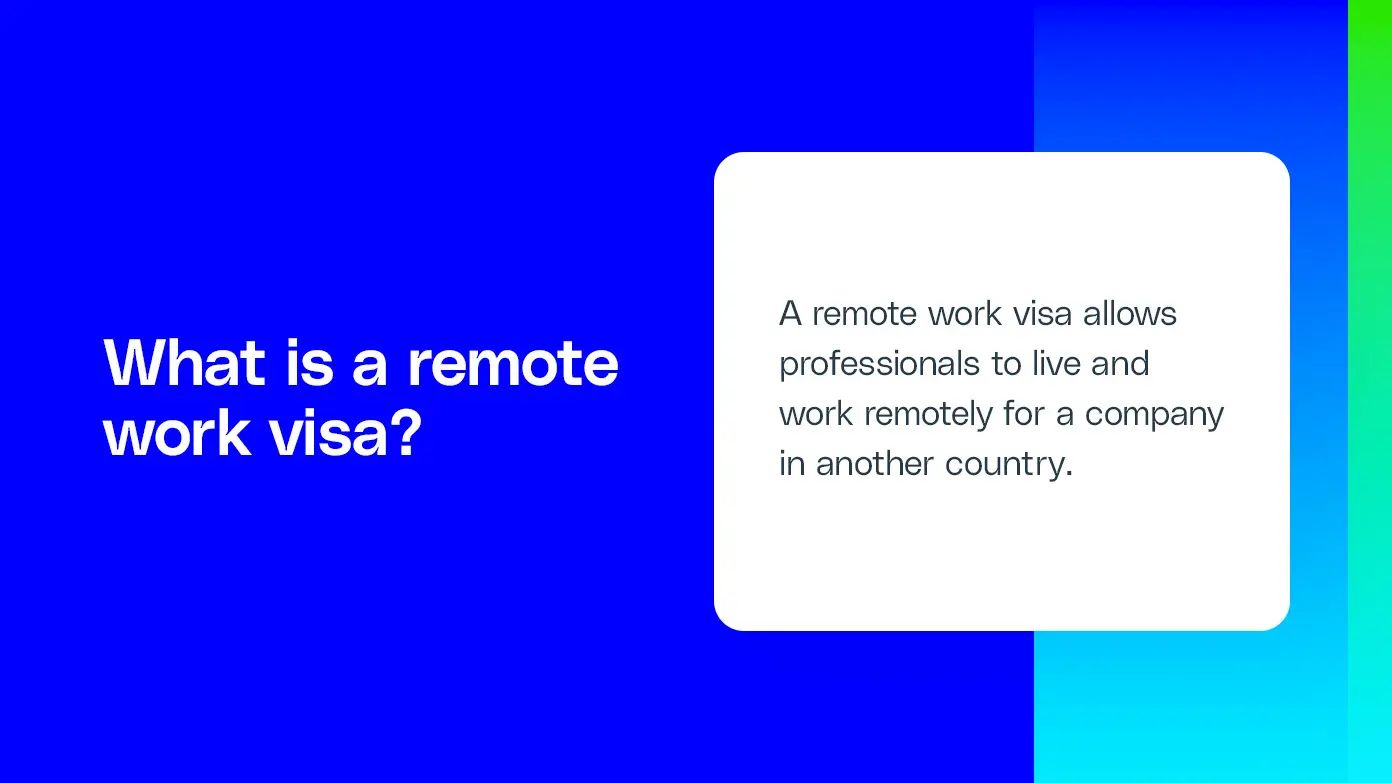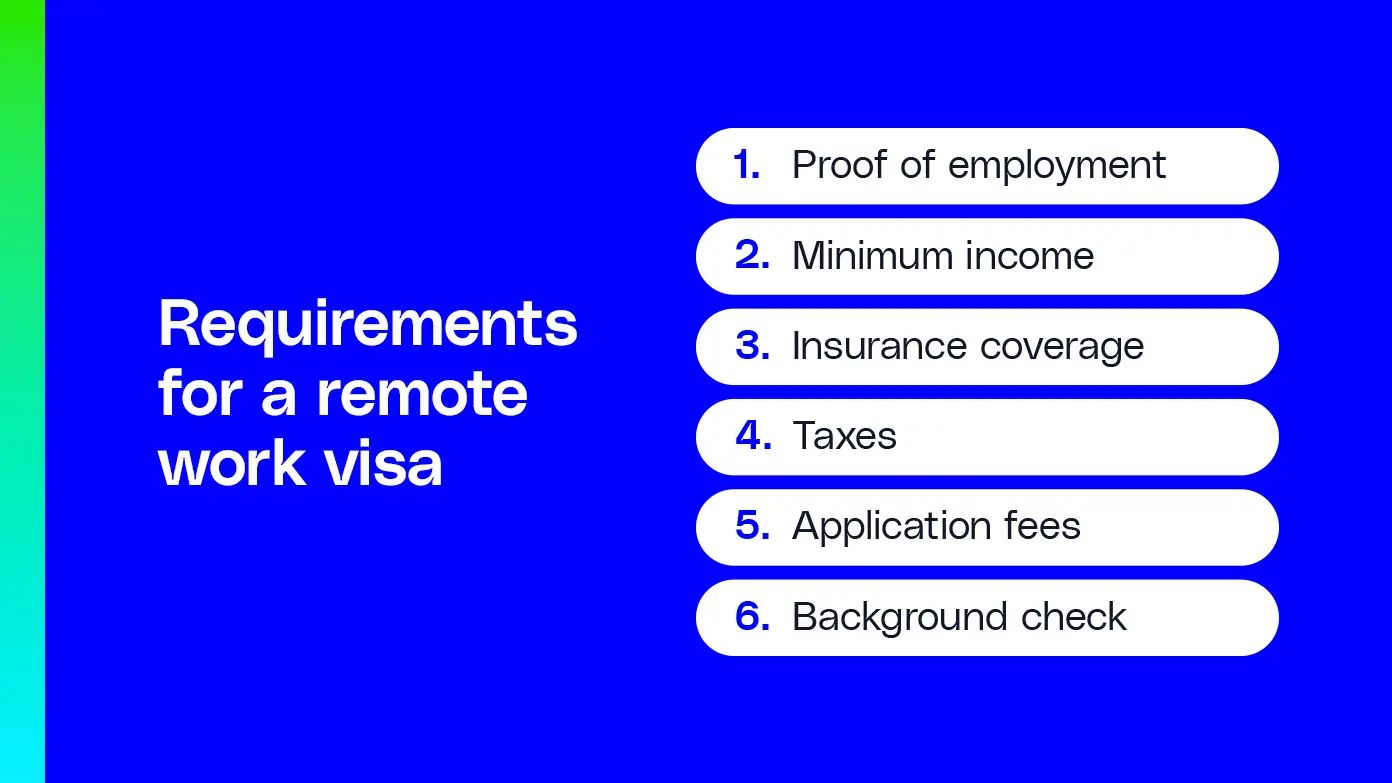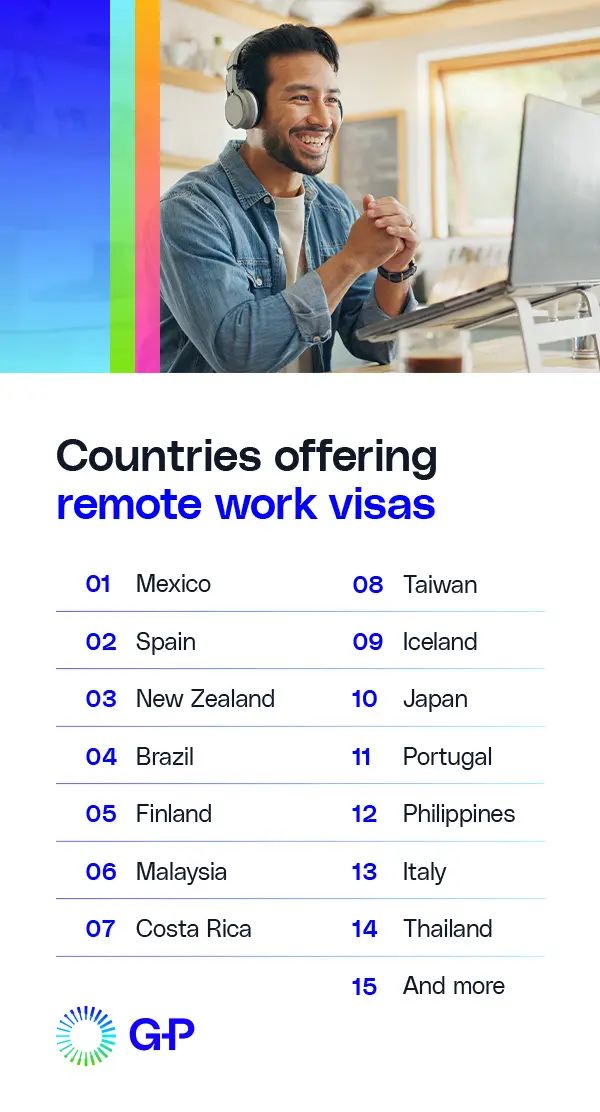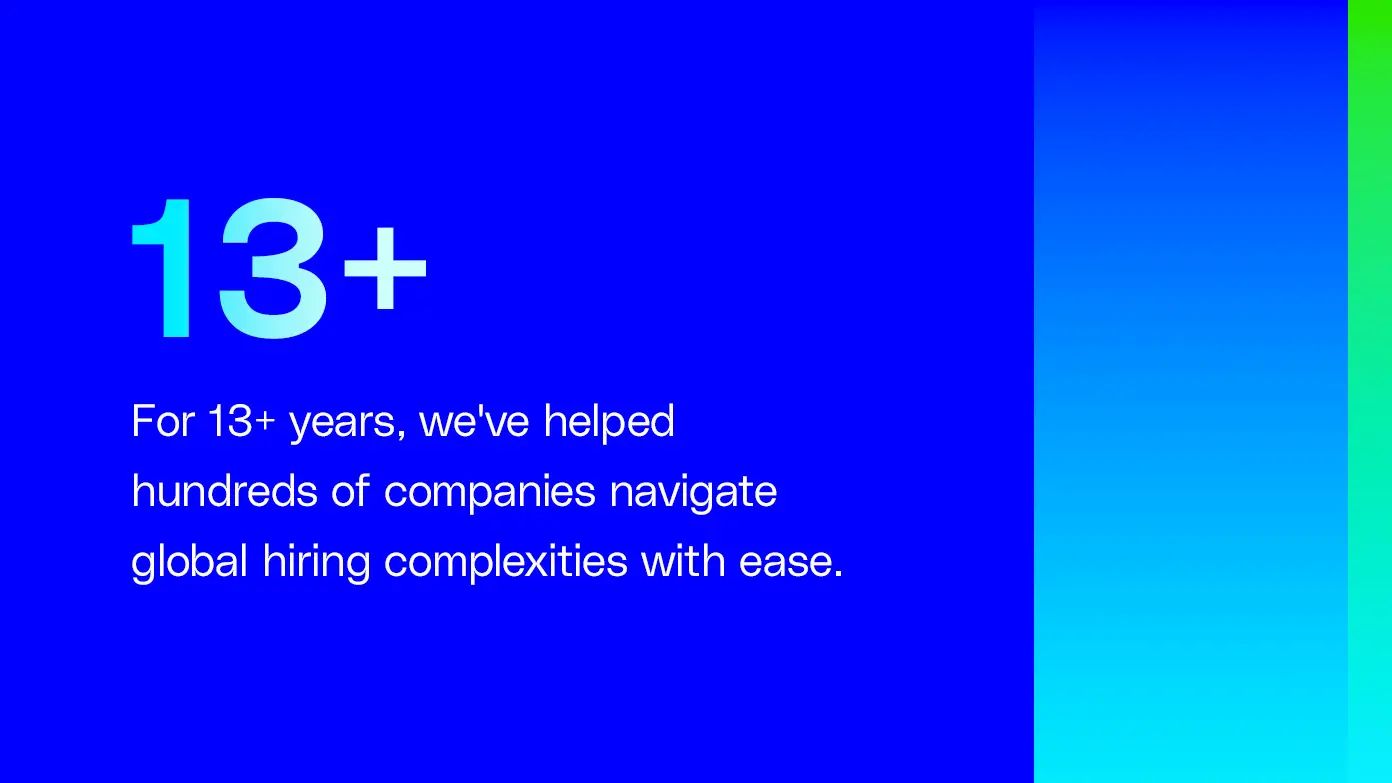Remote work visas are a powerful resource for workforce flexibility. These specialized visas allow employees to live in another country while working for a non-local company.
Remove work visas have changed how businesses approach global mobility. Understanding the benefits of remote work visas can give your company a competitive edge in attracting and retaining top talent.
What is a remote work visa?

A remote work visa allows professionals to live and work remotely for a company in another country. Countries want to attract spending and promote tourism and investment. In turn, people want to experience other cultures while maintaining employment.
The problem is that tourist visas limit stays, and traditional work visas require employment from local companies. To address this gap, several countries offer visas for remote workers.
What are the benefits of remote work visas?

Remote worker visas can enhance your global mobility programs. These visas bridge the gap between traditional work permits and tourist visas, so you can support your global workforce.
Let's explore how remote work visas can strengthen your global mobility strategies:
Increased employee satisfaction and retention

Offering remote work visa options shows your commitment to flexibility and work-life balance. Employees can work from their preferred locations while maintaining their jobs. This improves morale and strengthens loyalty to your organization.
Companies that support location independence often see lower turnover rates and higher employee engagement scores.
Enhanced business agility and scalability

A remote work visa can accelerate your entry into new markets. You can deploy talent to new regions without lengthy visa processes. Your team can conduct market research, build local relationships, and assess business opportunities before committing to traditional work visas or entity establishment.
Compliance and risk mitigation
Remote work visas provide a compliant framework for global work arrangements. Unlike tourist visas, which prohibit work activities, these specialized visas ensure employees operate legally in their chosen countries.
With remote worker visas, companies can confidently support employee mobility while complying with local labor laws and regulations.
What are the requirements for a remote work visa?

While remote work visa requirements vary by country, most programs share the following criteria:
-
Proof of employment: Employees must provide evidence such as employment contracts, company registration documents, and letters confirming remote work arrangements.
-
Minimum income requirements: Employees must show bank statements, employment contracts, or tax returns proving they meet the country-specific minimum monthly income requirements.
-
Insurance coverage: Some nations require comprehensive health insurance during the entire duration of the visa to cover emergency medical treatment, hospitalization, and sometimes repatriation.
-
Application fees: Most remote work visa applications have fees that increase if family members accompany the professional.
-
Background check: Some countries require a recent police clearance certificate before they grant a remote work visa.
Countries offering remote work visas

The list of countries that have remote work visas continues to evolve as more nations recognize the economic benefits of remote workers. Some examples include:
1. Mexico
Mexico's Temporary Resident Visa allows remote work for up to four years. Mexico considers remote work visa holders tax residents after 183 calendar days, although some treaties may provide relief from double taxation.
2. Spain
Spain's remote work visa, called the Telework Visa, is an initial one-year permit that can be extended to five years. Telework Visa applicants must demonstrate a monthly income equivalent to at least 200% of the Spanish Minimum Interprofessional Wage. As of 2025, that’s approximately EUR 2,368.
Employees must also have a criminal record certificate and health insurance. After 183 days, Spain taxes worldwide income at up to 47%.
3. New Zealand
The New Zealand visitor visa includes a remote work policy that allows professionals to work remotely in the country. Visa holders can stay in New Zealand for 6–9 months.
4. Brazil
Brazil's Digital Nomad Visa (VITEM XIV) is valid for one year and can be renewed for another year. Applicants need a USD 1,500 monthly income or USD 18,000 in savings. Brazil also taxes residents on worldwide income after 183 days, with rates up to 27.5%.
5. Finland
If you plan to work remotely in Finland, you’ll need a residence permit issued by Finnish authorities. Some residence permits grant full, unrestricted work rights, allowing you to work in any industry. Others may impose certain limitations on the type of work you can do. To confirm your work rights, review the details on your residence permit card.
Finland taxes worldwide income after 183 days of residence, but short-term stays may qualify for tax exemptions under specific treaties.
6. Malaysia
Malaysia's DE Rantau Nomad Pass allows remote workers to stay up to 12 months, and can be renewed for another year. Applicants in a “tech talent/profession” need a USD 24,000 annual income. Workers considered “non-tech talent/profession” need a USD 60,000 annual income.
All applicants require health insurance. After 182 days, tax residency applies with rates up to 30% on worldwide income.
7. Costa Rica
The Costa Rica remote work visa allows for a one-year stay with the possibility of renewal for another year. Employees will need a minimum monthly income of USD 3,000 for an individual or USD 4,000 if supporting dependents. Applicants also need health coverage.
Costa Rica doesn't tax global income for remote workers.
8. Taiwan
Taiwan's digital nomad visitor visa is open to individuals from visa-exempt countries. Applicants must provide the following:
-
Work contract
-
Proof of remote work experience
-
Proof of full health insurance
-
Account balance for the last six months
Employees above 30 must have proof of earning an annual salary of at least USD 40,000 in one of the last two years. Professionals under 29 must have an annual income of USD 20,000. Remote workers in Taiwan are subject to income tax after 183 days of residence.
9. Iceland
The Iceland remote work visa offers six-month stays for citizens from visa-exempt countries. Applicants must demonstrate a monthly income of ISK 1,000,000 and have health insurance. Remote workers enjoy a tax-free stay for the first 183 days.
10. Japan
Japan's remote work visa, called the Designated Activities visa, allows professionals from visa-exempt countries to stay and work remotely for up to six months. Considered a long-stay visa instead of a dedicated remote work visa, this visa allows professionals to work remotely during extended tourist stays in Japan. Applicants must demonstrate sufficient financial resources (JPY 10,000,000 or more) and health insurance.
11. Portugal
Portugal's remote work visa, known as the D8 visa, provides one-year renewable residency. Applicants must show the following:
-
Proof of accommodation in Portugal
-
Comprehensive health insurance
-
Clean criminal record
-
Work contract
-
Motivation letter
Portugal's Non-Habitual Resident regime offers significant tax benefits for 10 years, with global income potentially tax-free.
12. Philippines
The Philippines is launching its Digital Nomad Visa for people from countries that both offer remote worker visas to Filipinos and have a Philippine Foreign Service Post. Applicants will need the following:
-
Proof of sufficient income generated outside the Philippines
-
Proof of remote work using digital technology
-
A clean criminal record
-
Health insurance
13. Italy
Italy's remote work visa offers a one-year residency permit that’s renewable annually. Applicants must have the following:
-
An income triple Italy's minimum wage
-
Comprehensive health insurance
-
Proof of accommodation
-
At least six months of experience in their industry
-
Clean criminal record
Italy applies a 183-day rule for tax residency, after which worldwide income is taxable, although some regions have special tax incentives for new residents.
14. Thailand
Thailand's Destination Thailand Visa offers five-year multiple-entry visas for remote workers. Applicants need the following:
-
Proof of at least THB 500,000
-
Health insurance
-
A work contract from an international company
The Thailand remote work visa allows 180-day stays per entry, extendable for another 180 days. This flexible program allows unlimited entries during the five-year validity, making it ideal for employees with ongoing assignments in the area.
Other countries offering remote work visas
Many other countries offer visas for remote workers, including:
|
Region |
Country |
Duration of the remote work visa |
Taxation policies |
|---|---|---|---|
|
Middle East |
United Arab Emirates |
1 year, renewable |
No income tax |
|
Africa |
South Africa |
6 months to 3 years |
No tax under 183 days |
|
Africa |
Kenya |
1 year, renewable |
No tax on global income |
|
Africa |
Mauritius |
1 year, renewable |
No tax under 183 days |
|
Africa |
Seychelles |
1 year |
No tax on global income |
|
Africa |
Cabo Verde |
6 months, renewable |
183-day rule for tax residency |
|
Africa |
Namibia |
6 months |
No tax on global income |
|
Asia |
Indonesia |
1 year |
183-day rule for tax residency |
|
South America |
Colombia |
2 years |
183-day rule for tax residency |
|
South America |
Argentina |
6 months |
No tax on global income |
|
South America |
Ecuador |
2 years |
183-day rule, territorial tax system |
|
South America |
Uruguay |
6 months to 1 year |
No tax on global income |
|
Caribbean |
Dominica |
18 months |
No income tax |
|
Caribbean |
Bermuda |
1 year, renewable |
No tax |
|
Caribbean |
Antigua and Barbuda |
2 years |
No tax on global income |
|
Caribbean |
St. Lucia |
1 year |
No tax on global income |
|
Caribbean |
Monteserrat |
1 year |
No tax on global income |
|
Caribbean |
Curaçao |
6 months |
183-day rule for tax residency |
|
Caribbean |
Anguilla |
1 year |
No income tax |
|
Caribbean |
Jamaica |
1 year |
No tax on global income |
|
Caribbean |
Aruba |
90 days |
No tax under 183 days |
|
Caribbean |
Barbados |
1 year |
No tax on global income |
|
Europe |
Romania |
1 year |
183-day rule for tax residency |
|
Europe |
Estonia |
1 year |
183-day rule for tax residency |
|
Europe |
Greece |
1 year |
183-day rule for tax residency, 7% flat tax option |
|
Europe |
Hungary |
1 year |
183-day rule for tax residency |
|
Europe |
Malta |
1 year, renewable |
183-day rule for tax residency, remittance basis |
|
Europe |
Albania |
1 year |
183-day rule for tax residency |
|
Europe |
Croatia |
1 year |
183-day rule for tax residency |
|
Europe |
Czech Republic |
1 year |
183-day rule for tax residency |
|
Europe |
Latvia |
1 year |
183-day rule for tax residency |
|
Europe |
Montenegro |
2 years |
183-day rule for tax residency, 9% flat tax |
|
Europe |
Turkey |
1 year |
183-day rule for tax residency |
|
Europe |
Serbia |
1 year |
183-day rule for tax residency |
|
Europe |
Georgia |
1 year |
1% tax on global income |
If you need information on traditional work visas, G-P's Globalpedia is an expert guide for exploring the requirements and details.
How G-P helps with remote work visas

Digital nomad visas are great for individuals or small teams working temporarily from another country. Companies looking to build compliant global teams need more permanent solutions. G-P's global employment products and EOR solutions enable you to hire anyone, anywhere, quickly and compliantly.
-
Preliminary eligibility: Our Global Mobility Team assesses a professional's eligibility for work permit sponsorship based on minimum requirements. We use the results to identify the best visa option, limiting application rejections.
-
Immigration partners: We collaborate with a leading global immigration firm recognized as one of the best.
-
Right to work checks: We conduct thorough right-to-work checks to ensure all hires have the legal right to work in the respective country.
-
Trend analysis and scalability: We use AI and human expertise to analyze global mobility trends, including evolving visa regulations. We strategically grow our capabilities to support emerging workforce needs.
-
Holistic employee support: We support the entire employee journey, making the visa process smoother and improving the overall experience for global hires. From initial applications through renewals, we guide employees through each step.
-
Proactive visa expiration management: We track visa expiration dates, ensuring timely renewals and preventing employment disruptions or compliance issues for our customers.
-
Reduced risk and complexity: We simplify the complexities of global visa requirements, minimizing potential errors and compliance risks for businesses. Our expertise prevents costly mistakes while ensuring operations across borders.
-
Support for diverse talent needs: Our solutions accommodate various roles and international hiring scenarios.
Why trust us

As the recognized leader in global employment, we've helped hundreds of companies navigate global hiring complexities. Our team of HR, legal, and tax experts stays on top of changing regulations and new visa categories, so you can build your team anywhere with confidence.
Build your global teams with G-P today
G-P helps companies of all sizes hire, onboard, and manage global teams in 180+ countries, regardless of entity status. Our industry-leading global employment products and EOR solutions are backed by experts to streamline and simplify the entire global employment life cycle.















